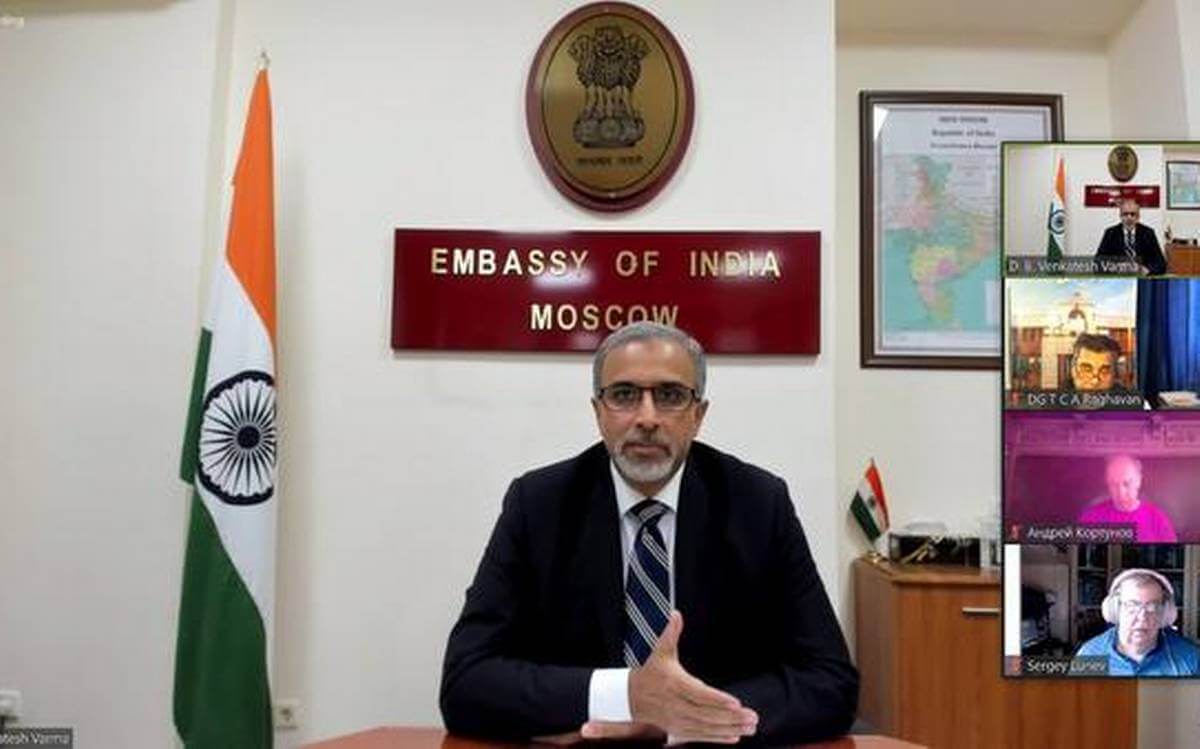At a video conference organized jointly by the Ministry of External Affairs-run Indian Council of World Affairs (ICWA) and the Russian International Affairs Council (RIAC) on Wednesday, Indian ambassador to Russia DB Venkatesh Varma signalled New Delhi’s wish to extend its reach in the Indo-Pacific and to cooperate and start a dialogue with Moscow to secure their shared interests in the region.
The conference, which has been jointly held alternatively in New Delhi and Moscow since 2017, was attended by Ambassador Varma, RIAC Director General Andrey Kortunov, ICWA Director-General TCA Raghavan, and a few other journalists and experts. The round table participants discussed the general trends in Indo-Russia relations as well as emerging opportunities for cooperation and economic development that are arising for the two countries in the face of the global health crisis. It was revealed that the two sides are exploring the activation of joint investment projects in Africa and Asia, specifically in digital technologies, to rekindle economic relations and disrupt the negative trend that currently exists. Further, both nations also plan to create “an ecosystem of startups and venture funds for the development of information technologies”.
Discussions at the conference also included the positive dynamics of bilateral cooperation in healthcare, medicine, nuclear and aerospace energy, and military-technical cooperation. Non-traditional security challenges like food security, social security, and healthcare were also discussed.
Most importantly, Varma said that India views Russia as a “very important Pacific power”, and stated that New Delhi’s interests in the Pacific are similar to those of Russia’s in the Indian Ocean. In terms of connectivity, the Indo-Pacific would serve as a “geographic continuum for cooperation”, which is why New Delhi aims to ensure that the region is fair and free for all.
See also: Russia-India-China Trilateral Meet Concludes, Modi to Meet Xi at G20 in November
One of the areas identified for such cooperation was the possibility of a joint investment from both countries in the oil and gas sector of Vietnam. At the same time, Varma also pointed out that India’s views, especially with respect to containing Chinese presence in the region, differed from those of Russia. Moscow’s Foreign Minister Sergey Lavrov at several occasions has said that Russia has no intention of creating new divisions in the Indo-Pacific. Varma stressed that India does not see countering Chinese hegemony as containment, but as a positive move that would bring countries together on the basis of principles, especially with respect to those of contracts and international law. “If India were to say that no country in the region should look for unilateral advantage at the cost of international rules and law, I am sure Russia will agree,” he said.
For India, the Indo-Pacific is a crucial and novel domain in its foreign policy tactics, and a focus on it represents a shift in threat perceptions to include maritime regions, not just its continental borders. In this vein, Paris, Tokyo, Washington, and Canberra have all supported and promoted a stronger role for New Delhi in the region, especially to counter increasing hegemonic activities by China in the high seas.
See also: The China Factor in India’s New Maritime Agreements With Australia
Both Russia and India also view ASEAN as critical to the concept of a stable Indo-Pacific. Joint support for the Vietnamese sector would be of immense importance, especially since Beijing and Hanoi have had several stand-offs due to their overlapping claims for an area in Vietnam’s Exclusive Economic Zone (EEZ) that is close to Indian oil blocks. For Russia, the proposed Arctic-Vladivostok-Chennai energy bridge also holds immense importance.
Read also: The Indo-Pacific: Indo-Russian Disconnect and Potential Divide
However, while the experts at the conference noted that Moscow and New Delhi share positions on most international issues and are free of any bilateral conflicts, their views on the Indo-Pacific, in particular, have been quite divergent in the past. Nevertheless, Russia’s crucial backend support in India’s border skirmish with China, as well as close relations between Prime Minister Narendra Modi and President Vladimir Putin indicates that the two are willing to actively cooperate. Putin is set to visit India late this year to mark the 20th anniversary of Indo-Russian strategic partnerships. The two are also looking to cooperate at international platforms like the United Nations, the G20, the Shanghai Cooperation Organization, BRICS, and further iterations of the Russia-India-China dialogue. Since 2014, Modi and Putin have met 22 times, with Putin coming to the country for 8 bilateral visits.
Image Source: The Hindu

